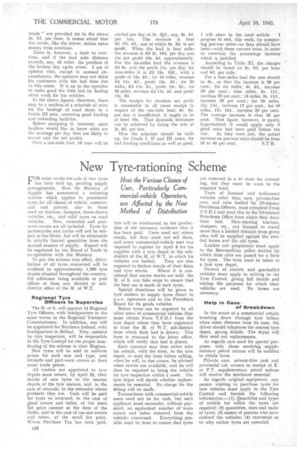New Tyre-rationing Scheme
Page 34

If you've noticed an error in this article please click here to report it so we can fix it.
How the Various Classes of User, Particularly Com. mercial-vehicle Operators, are Affected by the New Method of Distribution
rOR some weeks the sale Of new tyres
has been held up, pending supply arrangements. Now, the Ministry of Supply has announced a rationing scheme which applies to pneumatic tyres for all classes of vehicle, commercial and private, also to those used on tractors, dumpers, horse-drawn vehicles, etc., and solid tyres on road
vehicles. New, retreaded and partworn covers are all included, Tyres for motorcycles and cycles will not be subject to the Order, but will be obtainable in strictly limited quantities from the normal sources of supply. Export will be regulated by the Board of Trade in co-operation with the Ministry.
To put the scheme into effect, distribution of all tyres concerned will be confined to approximately 1,200 tyre depots situated throughout the country, the addresses being available at post offices or from any district or subdistrict office of the M. of W.T.
Regional Tyre Officers to Supervise The M. of S. will appoint 14 Regional Tyre Officers, with headquarters in the same towns as the Regional Transport Commissioners. In addition, one will be appointed for Northern Ireland, with headquarters in Belfast. They, assisted by tyre inspectors, will be responsible to the Tyre Control for the proper functioning of the scheme in their Regions.
New tyres will be sold at uniform prices for each size and type, and retreads and part-worn covers at their usual trade prices.
All traders not appointed as tyre depots must return, by April 25, their stocks of new tyres to the nearest depots of the tyre makers, and, in the case of retreads, to the retreader whose products they are. Cash will be paid for tyres so returned; in the case of giant covers and tubes, at the users list price current at the date of the Order, and in the case of car-size covers and tubes, at the retail list price. Where Purchase Tax has been paid, this will he reimbursed on the production of the necessary evidence that it has been paid. Users need not return stocks, but they must not sell them. and every commercial-vehicle user was required to register by April 8 for his supplies with a tyre depot in the subdistrict of the M. of W.T. in which his vehicles are fuelled. They are also required to declare details of their fleets
and tyre stocks. Where it is considered that excess stocks are held, the M. of S. can take steps to ensure that the best use is made of such tyres.
Special directions will be given to tyre makers to supply tyres direct to p.s.v. operators and to the Petroleum Board for its goods vehicles.
Before tyres can be acquired by all other usets of commercial vehicles they must obtain Form T.F.11/1 from the tyre depot where they have registered or from the M. of W.T. sub-district from which their fuel is drawn. This form is returned to the latter office, which will verify that fuel is drawn.
Each operator may then either take his vehicle, with the form, to the tyre depot, or send the form before calling, when he wilt, in due course, be advised when stocks are available, and he will then be required to bring the vehicle for tyre inspection within a week. The tyre depot will decide whether replacements be essential. No charge for the fitting will be matte.
Transactions with commercial-vehicle users need not be for cash, but each applicant must surrender, without payment, an equivalent number of worn covers and tubes removed from the
vehicles concerned. Everything possible must be done to ensure that tyres
are removed in a fit state for retreading, but they must be worn to the required limit.
Users of licensed and unlicensed vehicles other than cars, private-hire cars, and cabs fuelled by Divisional Petroleum Officers, must complete Form T.F.E.1 and send this to the Divisional Petroleum Office from which they dray,' their fuel. Slow-moving tractors, dumpers, etc., not licensed to travel more than a limited distance from given sites will be supplied against the verified forms and the old tyres.
London cab proprietors must apply to the Metropolitan police station by which their cabs are passed for a form for tyres. The form must be taken to a taxi tyre depot.
Owners of electric and gas-fuelled vehicles must apply in writing to the Tyre Control, giving full details and stating the purposes for which their vehicles are used. No forms are necessary.
Help in Case • of Breakdown In the event of a commercial vehicle breaking down through tyre failure when some distance from its base, .the driver should telephone the nearest tyre depot, giving details The depot will then send out replacements.
As regards cars used for special purposes, only those receiving supplementary petrol rations will be entitled to obtain tyres.
Private cars, private-hire cars and provincial cab owners in receipt of E. orP.T. supplementary petrol rations will receive the minimum essential.
As regards original equipment, any person wishing to purchase tyres for new vehicles must apply to the Tyre Control and furnish the following information:-(1) Quantities and types of vehicle for which the tyres are required; (2) quantities, sizes and make of tyres; (3) names of persons who have ordered the vehicles; (4) statement as to why rubber tyres are essential.




















































